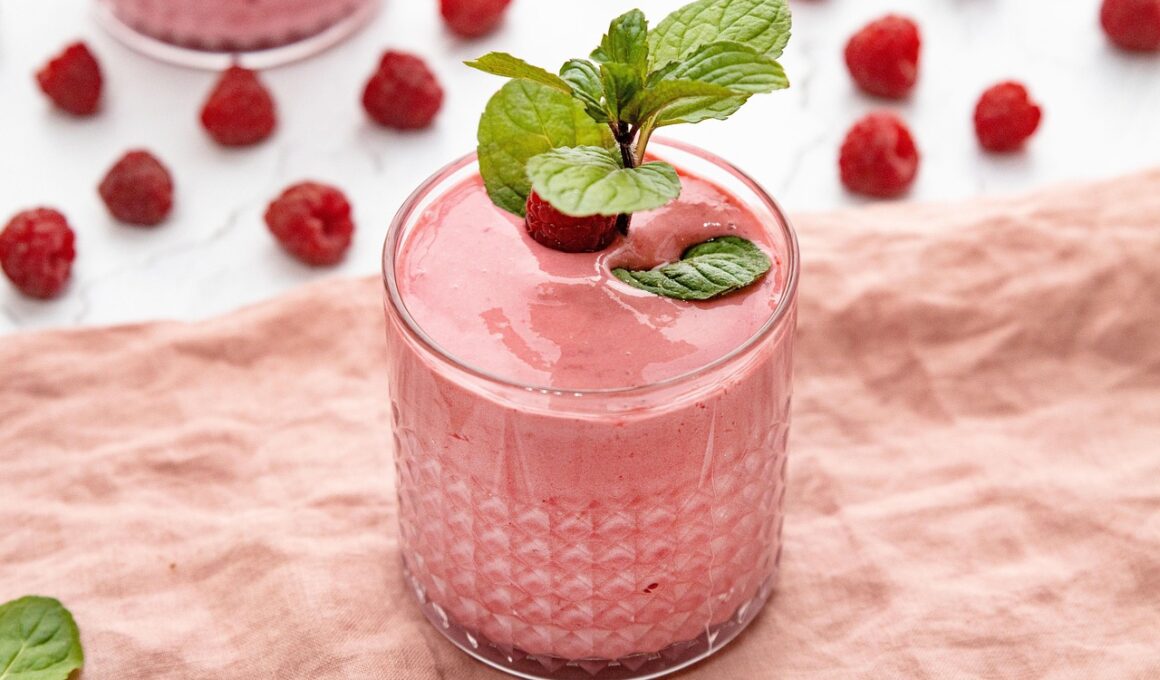Recovery Drink Timing: When to Drink for Maximum Benefits?
When it comes to post-workout nutrition, the timing of your recovery drink plays a significant role in maximizing benefits. Consuming a recovery drink shortly after exercising can help replenish depleted energy stores and aid muscle recovery. This drink often contains essential nutrients like protein, carbohydrates, and electrolytes that can support recovery. The recommended window for intake is typically within 30 minutes to two hours post-workout, as this is when your body is most receptive to nutrient absorption. It’s crucial to choose a recovery drink that aligns with your fitness goals and dietary preferences. For example, those looking to build muscle may prefer a drink high in protein, while endurance athletes might focus on carbohydrate replenishment. Always examine ingredient labels for quality and efficacy. Hydration is also vital, as water intake affects recovery speed and performance. Don’t forget that consistency is key! Establishing a regular routine around post-workout nutrition fosters better recovery and overall performance. Remember to monitor how your body responds over time to different drinks and adjust based on your unique needs and workout intensity.
In addition to timing, choosing the right type of recovery drink is essential. There are several categories of recovery drinks available on the market today. Options range from ready-to-drink shakes to powdered formulas. Cost and convenience may influence your decision. Ready-to-drink options are easy to grab on-the-go, while powdered drinks can be customized based on personal nutritional requirements. Further, some recovery drinks often contain added ingredients like BCAAs (branched-chain amino acids) and creatine, which can further support muscle repair and growth. Judging your energy levels and workout intensity can help you determine which type is most effective for your needs. If you trained with high intensity, consider switching to a more carbohydrate-dense drink to rapidly restore glycogen levels. Alternatively, if the workout was lower in intensity and duration, a lighter protein shake might suffice. Conducting a personal taste test on different brands and formulations can also enhance your experience. Listening to your body’s feedback is essential. Take note of how you feel after consuming various options to spot trends that boost your recovery.
Electrolyte Replacement
Another critical factor in post-workout recovery is electrolyte replacement, particularly for those who sweat significantly during exercise. Electrolytes such as sodium, potassium, calcium, and magnesium play crucial roles in muscle function and hydration. A loss of these essential minerals can lead to dehydration and cramps, negatively impacting recovery and performance. Consuming a recovery drink that contains electrolytes can assist in restoring balance within your body’s systems. Many commercially available recovery drinks address this need, boasting specific electrolyte ratios tailored to assist with rapid replenishment. It’s wise to pay attention to your individual needs; for instance, athletes engaged in prolonged or high-intensity workouts may require additional sodium compared to recreational exercisers. Monitoring your perspiration levels can help determine your electrolyte needs. If you find yourself sweating excessively, adding a pinch of salt to your post-workout drink or choosing drinks with higher sodium content can be beneficial. Be cautious of excessive sugar in some recovery drinks as it can hinder recovery. Consider comparing brands to find the ideal balance of electrolytes, hydration, and flavor, keeping performance at the forefront.
An often-overlooked aspect of recovery drink consumption is the role of carbohydrates. Carbs are essential for replenishing glycogen stores in your muscles, especially after endurance-focused workouts. When muscles are depleted, consuming carbs alongside protein becomes crucial for optimal recovery. Research indicates a carbohydrate-to-protein ratio of around 3:1 can maximize recovery benefits. This ratio aligns with the rapid replenishment of glycogen while facilitating muscle repair. Sports drinks aimed at endurance athletes typically contain higher carbohydrate levels, making them an excellent choice after long workouts. Alternatively, if you prefer traditional protein shakes, consider adding fruit, honey, or oats to enhance carbohydrate content. Timing remains critical; ensure you consume your recovery drink soon after workouts for maximum effectiveness. Don’t just settle for any carbohydrate source; focus on quality ingredients that provide functional benefits while also being enjoyable to drink. Integrating carbs into your recovery plan will not only enhance physical recovery but also contribute to your overall training performance and longevity. If you’re unsure about your ideal carbohydrate intake, consulting a nutritionist can provide personalized guidance to optimize your recovery regime.
Protein Types and Sources
Choosing the right protein source in your recovery drink can significantly impact muscle recovery. Proteins can come from various sources, including whey, casein, soy, pea, and more. Each source has distinct characteristics affecting digestion and nutrient absorption rates. For example, whey protein is popular for its rapid absorption, making it an excellent option post workout. In contrast, casein digests more slowly, potentially serving better for overnight recovery. Recognizing which type of protein suits your workout schedule and goals is imperative. If your workouts typically occur in the mornings, a whey-based protein drink post workout may provide immediate benefits. Alternatively, if you work out later in the day, transitioning to a slower digesting protein option could be wise. Additionally, some recovery drinks combine various proteins to deliver both rapid and gradual absorption benefits throughout the day. Experimenting with different protein sources can help you understand how your body responds. Monitor any digestive issues or discomfort after consuming certain types, and adjust your choices accordingly to promote better recovery.
Not all recovery drinks are created equal, and understanding ingredient labels is vital when making selections. Pay close attention to the components of your chosen drink and avoid those packed with added sugars and preservatives. High sugar levels can lead to spikes in insulin, which may hinder the recovery process, rather than aiding it. Opt for products that feature natural ingredients and minimal processing to ensure you receive the most benefit. Look for drinks that list protein sources first on the ingredient list, as this denotes higher protein content. Also, ensure that the recovery drink provides a reasonable balance of carbohydrates and electrolytes as well. Consider the calorie count per serving as well, especially if you’re monitoring caloric intake for specific fitness goals. Researching consumer reviews or collaborating with others who have similar goals can help guide your decision. Investing time in understanding your drink choices not only saves you from possible pitfalls but also optimizes your workout recovery process. Taking a proactive approach to your nutrition will bolster your fitness journey and overall well-being.
Personalization of Recovery Drinks
Lastly, personalizing your recovery drink can significantly enhance post-workout recovery. There’s no one-size-fits-all solution when it comes to nutrition. Different individuals possess unique needs based on workout intensity, duration, fitness levels, and body composition. As you progress in your fitness journey, evaluating how your body responds to various recovery drinks can help you identify what suits you best. Whether it’s adjusting ingredient ratios, changing protein sources, or incorporating specific supplements, tailoring your recovery drink can yield noticeable differences. Many athletes find it beneficial to maintain a food and drink diary to track nutrient intake and recovery progress over time. This practice allows for adjustments based on actual performance and recovery outcomes. Consider consulting with a sports nutritionist if you want personalized recommendations tailored to your individual requirements. Understanding how your body responds to different variables can unlock peak performance for fitness enthusiasts and competitive athletes alike. Making sufficient time for your recovery drink’s post-exercise consumption is just one aspect of a comprehensive recovery strategy aimed at achieving your goals.
In conclusion, the timing and choice of recovery drinks can profoundly impact your post-workout recovery. Prioritizing a well-timed intake of high-quality recovery drinks rich in proteins, carbs, and electrolytes can expedite recovery and optimize performance. Different types of recovery drinks serve varying purposes, so understanding your workout needs is crucial when selecting one. Pay careful attention to the ingredients and nutrition information. Personalization is the key to finding an effective recovery solution. Keeping track of your body’s responses to different drinks while seeking expert advice can help in refining your recovery strategy as your fitness journey progresses. Implementing these best practices will support muscle recovery, replenish energy stores, and ultimately impact your long-term fitness goals positively. Embrace the importance of post-workout nutrition, and make it a priority after each session. With consistency, these habits can not only improve recovery times but also enhance performance in future workouts. Remember, fueling your body with the right nutrients at the right time is vital for maintaining optimum health and athletic performance.


